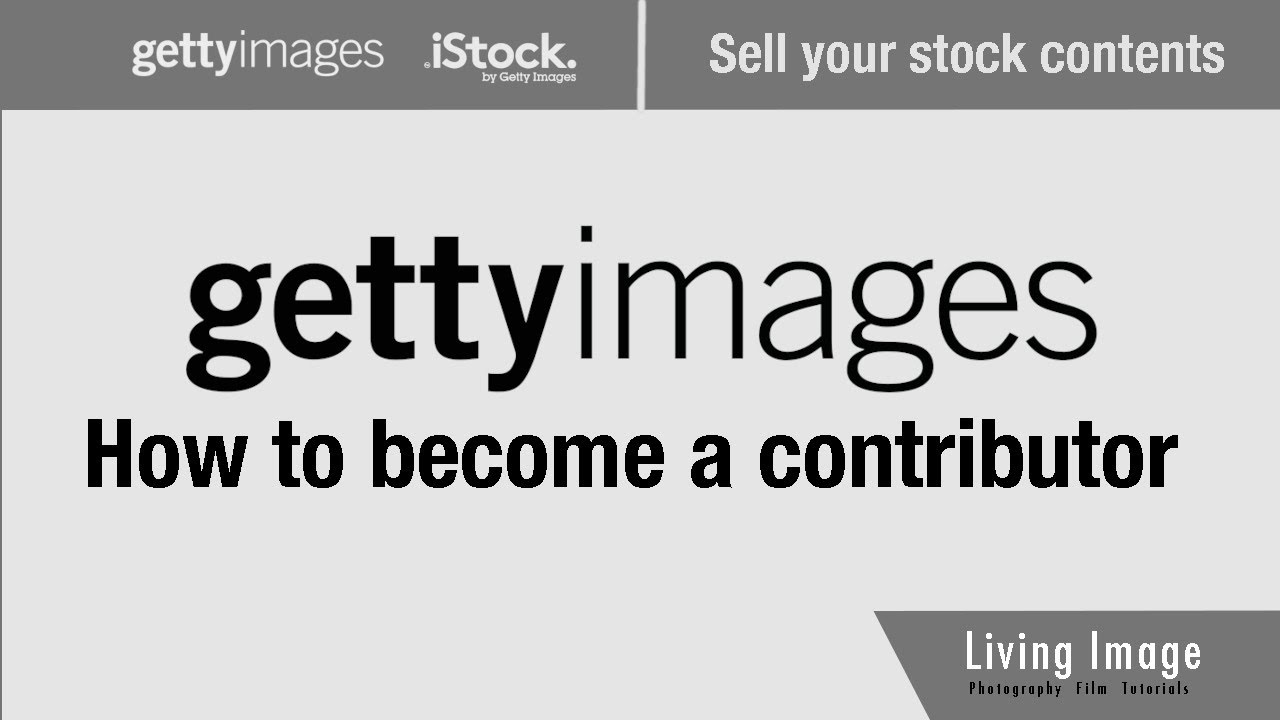If you're a photographer looking to turn your passion into a source of income, Getty Images is a name you’ll want to know about. Founded in 1995, Getty Images has established itself as a leading global digital media company that specializes in licensing high-quality imagery and video content to businesses, advertisers, and media outlets. With millions of images in their library,
As a contributor to Getty Images, you can showcase your photography skills to a vast audience and start earning money from your work. Every click of your camera could potentially turn into a paycheck. The sheer scale of Getty's operations means that you're not just uploading your photos into a void; there’s a vibrant community waiting to discover your unique perspective. If you’re ready to delve into the world of stock photography and make a mark, let’s explore how you can become a contributor and the benefits that come with it.
Understanding the Contributor Program

The Getty Images Contributor Program is an exciting opportunity for photographers of all levels—whether you’re an amateur with a knack for capturing life’s moments or a seasoned pro looking to expand your portfolio. But what does it really entail? Let’s break it down:
- Eligibility: Anyone can apply to become a contributor, as long as you have original photographic content that’s suitable for licensing.
- Application Process: The first step is to fill out an online application form on the Getty Images website. Your submission will be reviewed, and if approved, you're welcomed into the contributor community.
- Focus Areas: Getty is interested in a wide range of content, which can include lifestyle, travel, nature, business, and more. The key is to create high-quality images that meet current trends and demands.
Once you’re accepted, you can start uploading your images on the Getty platform. Each image will go through a review process to ensure it meets their quality and relevance standards. You can track the performance of your images through your contributor dashboard, where you'll see how many times your photos have been downloaded and how much you've earned.
The potential for income varies based on numerous factors, including the type of license purchased, the exclusivity of your content, and, most importantly, how well your images resonate with buyers. Overall, the Contributor Program at Getty Images empowers you to monetize your creativity while gaining international exposure. It’s a win-win for both budding and experienced photographers!
Also Read This: How to Access Getty Images for Free and Legally Use Them
Preparing Your Photos for Submission
So, you've got a collection of stunning photographs that you’re ready to share with the world, but hold on! There’s a bit of prep work to ensure your images stand out on Getty Images. First things first, let's talk quality. The images you submit should ideally be high resolution—aim for at least 300 DPI (dots per inch). This ensures that your photos look crisp and professional.
Next, keep a close eye on the file format. Getty prefers JPEG files, so make sure to adjust your settings accordingly before uploading. It's also a smart idea to label your files appropriately. Instead of something generic like "IMG_1234," try naming your file something descriptive that reflects the image content, like "Sunset-over-Lake-2023.jpg." This small effort can make a huge difference!
Now, let's discuss the importance of metadata. When you upload your photos, you'll have the opportunity to add keywords, titles, and descriptions. This is crucial for searchability. Use specific and relevant keywords to help potential buyers find your work. Think like a customer: What terms would they search for?
Lastly, don't forget about model or property releases if your photos feature identifiable people or private locations. Getty Images requires these documents to avoid any legal issues, so make sure you have them sorted out before submission!
Also Read This: How to Submit Your Photos to Getty Images
How to Create a Getty Images Account
Getting started on Getty Images is as easy as pie, and all you need is a few minutes and some basic information! First, head over to the Getty Images website. You’ll find a prominent option to “Join” or “Sign Up.” Click on that, and let’s get rolling!
You will be prompted to enter some personal details, like your name, email address, and a strong password. It’s important to use a unique password to keep your account secure. After that, you might have to confirm your email address—just check your inbox and click on the verification link!
Once you’re in, you’ll have the option to choose between different account types—select "Contributor" when asked. This way, you’ll be set up to upload your amazing photos. After making your selection, it’s a good idea to read through Getty's Contributor Agreement. Don’t worry; it’s not as boring as it sounds! It’ll just give you an idea of what to expect, including how royalties work.
| Steps to Create a Getty Images Account | Details |
|---|---|
| 1. Visit Getty Images | Go to the Getty Images website. |
| 2. Click on “Sign Up” | Find and click the option to join or sign up. |
| 3. Enter Personal Details | Fill out your name, email, and password. |
| 4. Verify Email | Look for an email from Getty to verify your account. |
| 5. Choose Contributor Account | Select the Contributor account type to upload photos. |
| 6. Read the Agreement | Take the time to understand what you're signing up for. |
And voilà! You're one step closer to becoming a Getty Images contributor, ready to showcase your talent and start earning from your photos. Easy, right?
Also Read This: Understanding Getty Images Ownership of Archive Photos Over 50 Years Old
Uploading Your Photos
Once you've decided to become a contributor on Getty Images, the next exciting step is uploading your photos. This is where your creativity can truly shine, and you can start sharing your work with the world! But before you hit that upload button, let's walk through the essentials.
The process is straightforward. First, sign into your Getty Images contributor account and navigate to the upload section. You'll be prompted to select the images you wish to upload from your device. It’s essential to upload high-resolution images that meet Getty's technical specifications; aim for a minimum resolution of 4 megapixels.
Before uploading, make sure your images are well-edited. Consider the following:
- Clear Composition: Ensure your subject is in focus and has a clean background.
- Natural Lighting: Utilize natural light when possible to enhance the quality of your shots.
- Image Variety: Diversify your portfolio with distinct styles, subjects, and themes.
After you select your images, you'll need to add metadata, which includes titles, descriptions, and keywords. This step is crucial, as it helps potential buyers find your work. Use specific, relevant keywords that accurately describe your photos, and don’t forget to capture the essence of your images in your descriptions!
Finally, review Getty's content guidelines to ensure your photos align with their policies before publishing. Once everything looks good, hit the submit button and let your creativity take flight in the marketplace!
Also Read This: How to Remove Getty Images Watermark Online Legally
Best Practices for Maximizing Earnings
Alright, so you've uploaded your photos and are ready to earn some cash. But how do you ensure that your hard work translates into actual income? Here are some best practices to help you maximize your earnings on Getty Images:
- Diversify Your Portfolio: The more diverse your collection is, the better your chances of appealing to a wider audience. Consider different subjects, styles, and formats.
- Stay Current: Trends change all the time, and staying up-to-date on what's popular can give you an edge. Explore seasonal themes, holidays, or current events to create timely content.
- Quality Over Quantity: Focus on uploading fewer, high-quality images rather than overwhelming your portfolio with mediocre ones. Buyers look for exceptional work.
- Promote Your Work: Use social media and other platforms to share your photographs. Create buzz and direct traffic to your Getty Images portfolio.
- Collaborate: Consider partnering with other photographers, models, and influencers. Collaborations can introduce you to new audiences and expand your reach.
Additionally, keep an eye on your statistics in your contributor dashboard. This will help you understand which types of photos are performing well, allowing you to tailor your uploads accordingly. Lastly, be patient! Building a successful photography business takes time, but with persistence and attention to detail, you can definitely reach your earnings goals.
Also Read This: How to Legally Download and Use Photos from Getty Images
Understanding Licensing and Royalties
When you dive into the world of photography, especially with platforms like Getty Images, understanding the nuances of licensing and royalties becomes crucial. So, what does licensing really mean? Essentially, licensing is the permission you grant to others to use your images under specific conditions. Getty Images offers several types of licenses, including:
- Royalty-Free (RF): This means that once your photo is purchased, the buyer pays a single fee and can use the image multiple times without incurring additional charges.
- Rights Managed (RM): With RM, buyers pay according to how they plan to use the image. This type of license can get complex; factors like duration, territory, and specifics of use can affect pricing.
- Editorial Use Only: Images categorized under this type cannot be altered and are used for newsworthy topics, representing reality rather than artistic expression.
As a contributor, it’s vital to know what each license entails and how it affects your potential earnings. For instance, RF images tend to sell in higher volumes, while RM images can result in higher payouts for specific uses. To maximize your earnings, consider mixing both styles in your portfolio.
Now, let’s talk about royalties! This is the money you make when someone purchases or licenses your photo. Getty Images typically pays contributors a percentage of the sale price, and this can vary widely. Factors influencing your royalty rates may include:
| Factor | Impact on Royalties |
|---|---|
| Image type | Royalty-Free typically has lower earnings per image compared to Rights Managed. |
| Size of the purchase | Larger or higher-resolution images often demand better payouts. |
| Your reputation | Well-rated photographers may receive higher royalty percentages due to demand. |
Understanding these elements can help you navigate your journey as a Getty Images contributor more effectively and boost your earnings! Keep that knowledge in your back pocket as you start on your photography adventure.
Conclusion
Becoming a contributor on Getty Images is more than just snapping pictures; it’s about strategically positioning yourself to maximize your efforts and creativity. Throughout this journey, you've learned the ropes of getting started, the importance of building a strong portfolio, and the intricacies of licensing and royalties. Now, as you stand on the brink of this exciting venture, remember a few key takeaways:
- Focus on Quality: High-quality images stand out. Invest time in learning and perfecting your craft.
- Know Your Niche: Identify what types of photos sell well and focus on those—whether it’s landscapes, lifestyle shots, or commercial images.
- Stay Informed: The photography business evolves. Stay updated with market trends and adapt your strategy accordingly.
- Engage with the Community: Connect with fellow photographers, share tips, and learn from each other. You’ll find support and inspiration.
Ultimately, becoming a successful contributor on Getty Images is about passion, persistence, and learning along the way. So grab your camera, unleash your creativity, and start capturing moments that will resonate with others. Who knows? Your next shot could lead to great earnings!
 admin
admin








